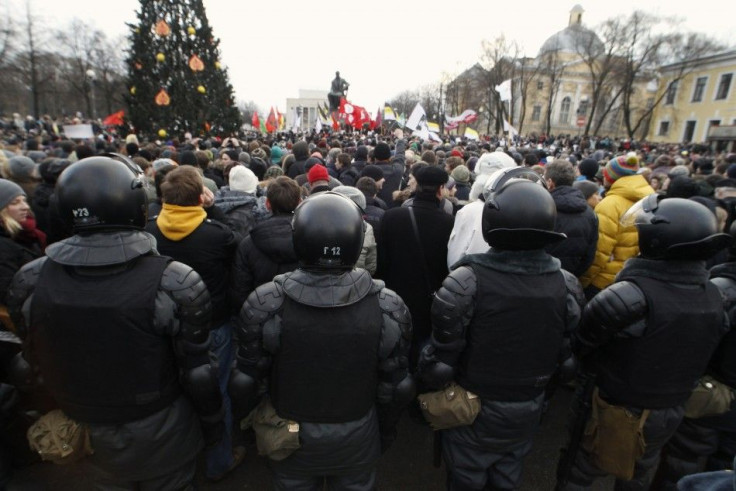Russians Stage Largest-Ever Protests Against Putin's Rule

Tens of thousands of people took to the streets across Russia on Saturday to demand an end to Vladimir Putin's rule and a rerun of a parliamentary election in the biggest opposition protests since he rose to power more than a decade ago.
Protesters waved banners such as The rats should go! and Swindlers and thieves -- give us our elections back! in cities from the Pacific port of Vladivostok in the east to Kaliningrad in the west, nearly 7,400 kilometers (4,600 miles) away.
Riot police were out in force with dogs and in trucks, but did little to try to put down protests that showed a groundswell of discontent with Prime Minister Putin as he prepares to return to the presidency next year and anger over an election on Dec. 4 that the opposition says was slanted in his party's favor.
Today 60,000, maybe 100,000 people, were at this rally, former Prime Minister Mikhail Kasyanov said in a speech to flag-waving and chanting protesters packed into Bolotnaya Square across the Moscow River from the Kremlin.
This means today is the beginning of the end for these thieving authorities, said Kasyanov, who now leads an opposition movement that was barred from the election.
The rallies, many of them held in freezing snow, were a test of the opposition's ability to turn public anger into a mass revolt on the scale of the Arab Spring rebellions that brought down rulers in the Middle East and North Africa.
Most Russian political experts say the former KGB spy who has dominated the world's largest energy producer for 12 years is in no immediate danger of being toppled and that protests are hard to keep going across such a vast country.
But they say Putin's authority has been badly wounded and may gradually fade away when he returns as president unless he handles demands ranging from holding fair elections to reducing the huge gap between rich and poor.
The time has come to throw off the chains, one of the main opposition figures, blogger Alexei Navalny, said in a message sent from prison following his arrest in a protest on Monday.
We are not cattle or slaves. We have a voice and we have the strength to defend it, he said in the message, which was read out by a colleague at the Moscow protest.
Protests Across the Country
People protested in dozens of cities such as Vladivostok in Russia's far east, Perm in Siberia, Arkhangelsk in the Arctic north, Kaliningrad and St. Petersburg in the west, and Karelia in the northwest.
The only initial report of police cracking down was in Kurgan, east of Moscow on Russia's border with Kazakhstan, where an unsanctioned protest of about 400 people was dispersed, the Interfax news agency said.
About 20 people were detained in Khabarovsk near Russia's border with China, the RIA news agency said. Other reports put the number of detentions at dozens.
In Vladivostok, where Putin's United Russia party was beaten by communists in the parliamentary election, about 1,000 people protested under banners saying We are against mass falsifications! and insulting Putin, witnesses said.
In Moscow, people of all ages gathered, many carrying white carnations, which they said was the symbol of their protest. They waved pictures of Putin and President Dmitry Medvedev, declaring, Guys, it's time to go.
This is history in the making for Russia. The people are coming out to demand justice for the first time in two decades, justice in the elections, said a 41-year-old employee in the financial-services sector, who gave his name only as Anton.
Like other protesters, he wore a white ribbon that he said symbolized the dissent of the people.
I want new elections, not a revolution, said Ernst Kryavitsky, 75, a retired electrician dressed in a long brown coat and hat against the falling snow who was protesting even though he did not expect Putin to be ousted.
At least 100 trucks full of riot police were parked near the Kremlin and columns of police trucks were driving around the capital. Helicopters at times buzzed overhead. Police put the number of protesters at around 25,000, and organizers said it was as many as 100,000.
Putin's office declined immediate comment on the rallies. Medvedev has denied the allegations of fraud in the election. Putin has accused the United States of encouraging and financing the protesters.
State television had largely ignored the protests that started this week in Moscow and St. Petersburg, but news bulletins contained footage of the rallies on Saturday.
Anger over Election
The protesters were angered by the election in which United Russia won only a slim majority in the State Duma lower house, widely seen as a growing sign of discontent with Putin's rule.
Protesters say only widespread falsifications prevented the result for United Russia being much worse.
Putin and Medvedev have both said that Russians have a right to protest, but only within the bounds of permission granted by local authorities who normally allow demonstrations only at specific locations and limit turnout.
Putin, 59, remains Russia's most popular leader in opinion polls, and he has dominated Russia under a political system in which power revolves around him. But his ratings have been falling, and he was booed at a sports event last month.
He won support by restoring order after the chaos of the 1990s following the collapse of the Soviet Union, and created the image of a rugged leader with stunts such as fishing and horse riding while bare-chested.
But many Russians felt disenfranchised when he and Medvedev announced plans to swap jobs after next year's presidential election and said they had taken the decision years ago.
The protests have shown the power of social media, such as Facebook and Twitter, through which most of the protests have been organized.
(Additional reporting by Gleb Bryanski, Steve Gutterman and Guy Faulconbrudge, editing by Timothy Heritage)
© Copyright Thomson Reuters 2024. All rights reserved.












